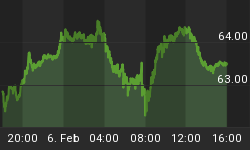Signs Of The Times:
The Peoples Bank of China recently did a survey that noted that over 40% of Chinese households plan to invest in the stock market, a 10 percentage point increase since 1Q.
On June 22, Halkin Services editor Robin Aspinall added: "They trust a bubbling stock market more than dodgy banks."
"Then there is California, where housing woes helped to push the unemployment rate to 5.2% in May from 4.8% in December. If more people lose their jobs, expect more pain in the mortgage-backed securities market. Of the loans backing all subprime securities issued in 2006, 28% originated in California.
Don't expect the Fed, which meets this week, to ride to the rescue.
Inflation concerns remain paramount at the Fed and Fed officials still argue that the pain from the subprime mess will be contained."
- Wall Street Journal, June 25
"Freddie Mac says that 'the subprime slump is contained'."
"Fund manager says 'the whole subprime mess has been basically looked over and is not taken as a big concern.'"
- Bloomberg, June 26
The subprime mortgage bond we've been following (the ABX HE BBB) which was quoted at par in August, fell to 73 on February 27. It rebounded to 84.6 on May 24 from which it has dropped to 71.8 yesterday - a new low since the bear started in August.
As for the 'no big concern' complacency:
"Woes of the U.S. subprime mortgage market reached across the Atlantic to claim a new victim.
Queen's Walk Investment fund has been positioned in mortgage-backed securities and its stock is down 39% since early in the year."
- Wall Street Journal, June 27
The problem is not as simple as having an old-fashioned rally with enough power to create the dynamics for a top. It is the additional hazard of a financial culture that admits no risk because risk has been banished.
The notion is that with the Fed managing things "nothing can go wrong". Ironical as it is, the resultant confidence increases the amount of risk carried.
Over the centuries, the private-side of the investing world can voluntarily create huge speculative bubbles even when the senior central bank was being held responsible by a convertible currency.
Near a top speculators can believe the most preposterous stories so long as the market is going up. That's without reinforcement from the notion of a super agency that virtually guarantees prosperity. The last combination of these forces created the high-tech "Goldilocks" mania that blew out in the first half of 2000. Until the tech-crash the abilities of the Fed were celebrated around the world.
Then in January 2001 when the Nasdaq had given up 3.5 trillion, bitter op-ed pieces in the Financial Post and Wall Street Journal condemned the Fed for allowing the crash to happen.
Our view on interventionist economics is essentially that it has been a highly speculative experiment that the investing public has little choice but to speculate equivalently against the Fed's weapon of choice - chronic currency emission and depreciation.
Official speculation exacerbates private speculation.
In underwriting, risk can be reduced by limiting bond flotations to AAA credits. However, and likely unfortunately, some financial agents (not in government) found the risk-reduction game profitable. The first example was equity "portfolio insurance" of 1987 that turned what would have been a normal stock market correction into a unique crash.
Recently the chimera of risk elimination has developed in debt markets.
The June 25 Barron's Online story headlined: "A Mortgage Meltdown for MBIA" and reviewed the risk in the giant municipal-bond and corporate-debt insurer.
Another hazard has been CDO legerdemain whereby enough low-grade debt is bundled together in order to merit an investment grade "star" from a credit rating agency. This has always been suspect, but another level of hazard has been the placing of so many of these instruments that don't really trade with the comfort of pricing by mathematical model rather than by market transactions.
As the saying goes - the street can believe the most preposterous stories so long as the "price" is going up. The "price" on many schemes to eliminate risk is starting to falter.















